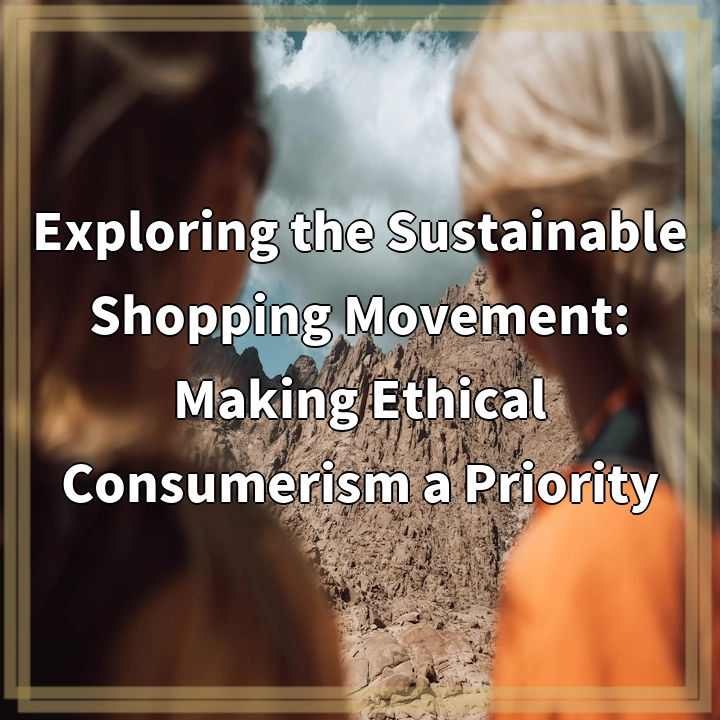
What is the Sustainable Shopping Movement?
The Sustainable Shopping Movement is a growing global trend that encourages consumers to make mindful and ethical choices when purchasing products. It goes beyond the simple act of buying and focuses on the environmental and social impact of our consumption habits. Ethical consumerism promotes the idea that our purchasing decisions have the power to shape a more sustainable and just world.
Real-World Problems Associated with Ethical Consumerism
As with any movement, the Sustainable Shopping Movement faces various challenges in its quest to make ethical consumerism a priority. Here are some of the real-world problems that pose obstacles to wider adoption and implementation:
Limited Availability of Sustainable Products
One of the main hurdles in practicing ethical consumerism is the limited availability of sustainable products. While there has been a rise in eco-friendly options in recent years, they are still not as accessible or affordable as conventional alternatives. This can make it challenging for consumers to make ethical choices when more sustainable options are scarce or not widely marketed.
Greenwashing and Lack of Transparency
Greenwashing, the act of misleading consumers about the environmental benefits of a product or company, is another problem faced by ethical consumerism. Companies may claim to be “green” or “eco-friendly” without proper certifications or verifiable evidence to support their claims. This lack of transparency makes it difficult for consumers to differentiate between genuinely sustainable products and those marketed as such for mere promotional purposes.
Impact of Fast Fashion and Overconsumption
The fast fashion industry is notorious for its negative environmental and social impacts, posing a significant challenge to the Sustainable Shopping Movement. The demand for cheap and trendy clothing has fueled the overproduction and overconsumption of garments, resulting in excessive waste, pollution, and exploitation of workers. Encouraging consumers to opt for sustainable fashion alternatives and reduce their overall consumption is a crucial aspect of promoting ethical consumerism.
Affordability and Accessibility Barriers
Ethical products often come at a higher price point compared to their conventional counterparts. This affordability barrier can restrict the adoption of ethical consumerism, as not everyone may have the financial means to consistently purchase sustainable products. Additionally, geographical and socioeconomic factors can limit the accessibility of ethical options, further hindering the widespread adoption of ethical consumerism practices.
Educational and Cultural Shifts
Promoting ethical consumerism requires educational efforts to raise awareness about the impact of consumption on the environment and society. A lack of widespread knowledge and understanding of the issues surrounding sustainability can make it challenging to motivate individuals to change their shopping habits. Furthermore, cultural norms and societal pressures may prioritize convenience or the latest trends over ethical considerations, making it harder to shift towards sustainable shopping practices.
In Conclusion
Despite the real-world problems associated with ethical consumerism, the Sustainable Shopping Movement continues to gain momentum. By addressing these challenges through innovative solutions, increased transparency, education, and collective action, we can work towards making ethical consumerism a priority and create a more sustainable and equitable future.

Promoting Solutions for Ethical Consumerism
To overcome the challenges faced by ethical consumerism, it is important to implement solutions that can drive positive change. Here are some key strategies and approaches to promote ethical consumerism practices:
Increasing the Availability of Sustainable Products
Efforts should be made to expand the availability and accessibility of sustainable products. This can be done through supporting and promoting local and eco-conscious brands, advocating for sustainable production practices, and encouraging retailers to stock a wider range of sustainable options. Collaborations between sustainable businesses and larger corporations can also help scale up production and distribution, making ethical products more widely available.
Enhancing Transparency in the Marketplace
Improving transparency is essential to combat greenwashing and enable consumers to make informed choices. Implementing clear labeling systems and certifications can help verify the environmental and social claims of products. Regulatory bodies and independent organizations can play a vital role in setting and upholding standards for transparency, ensuring that companies provide accurate information about their production processes, sourcing, and ethical practices.
Promoting Sustainable Fashion and Responsible Consumption
Addressing the negative impacts of fast fashion requires a shift in consumer behavior towards sustainable fashion alternatives and responsible consumption. Educating consumers about the environmental and social consequences of fast fashion can help raise awareness and encourage more thoughtful purchasing decisions. Supporting ethical fashion brands, participating in clothing swaps, and embracing slow fashion principles are effective ways to promote sustainable fashion and reduce overconsumption.
Making Ethical Products More Affordable
To overcome affordability barriers, initiatives should be taken to make ethical products more financially accessible. This can be achieved through government incentives, subsidies, or tax breaks for sustainable businesses, as well as collaborations between ethical brands and mainstream retailers to offer more affordable options. Additionally, promoting circular economy models, such as clothing rental services or refurbished electronics, can provide cost-effective alternatives for consumers.
Education and Awareness Campaigns
Educating consumers about the importance of ethical consumerism is key to driving behavior change. Implementing educational programs in schools, colleges, and communities can help raise awareness about the environmental and social impact of consumer choices. Engaging with media platforms and influencers to promote ethical consumerism and sharing success stories of sustainable businesses and initiatives can also inspire and empower individuals to make more conscious shopping decisions.
In Conclusion
By implementing these solutions and adopting a holistic approach, we can overcome the obstacles to ethical consumerism and create a more sustainable and equitable society. Through collaboration, advocacy, education, and individual actions, we can make ethical consumerism a mainstream practice and contribute to positive environmental and social change.















